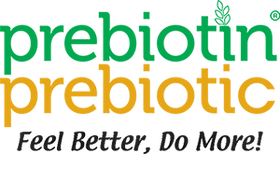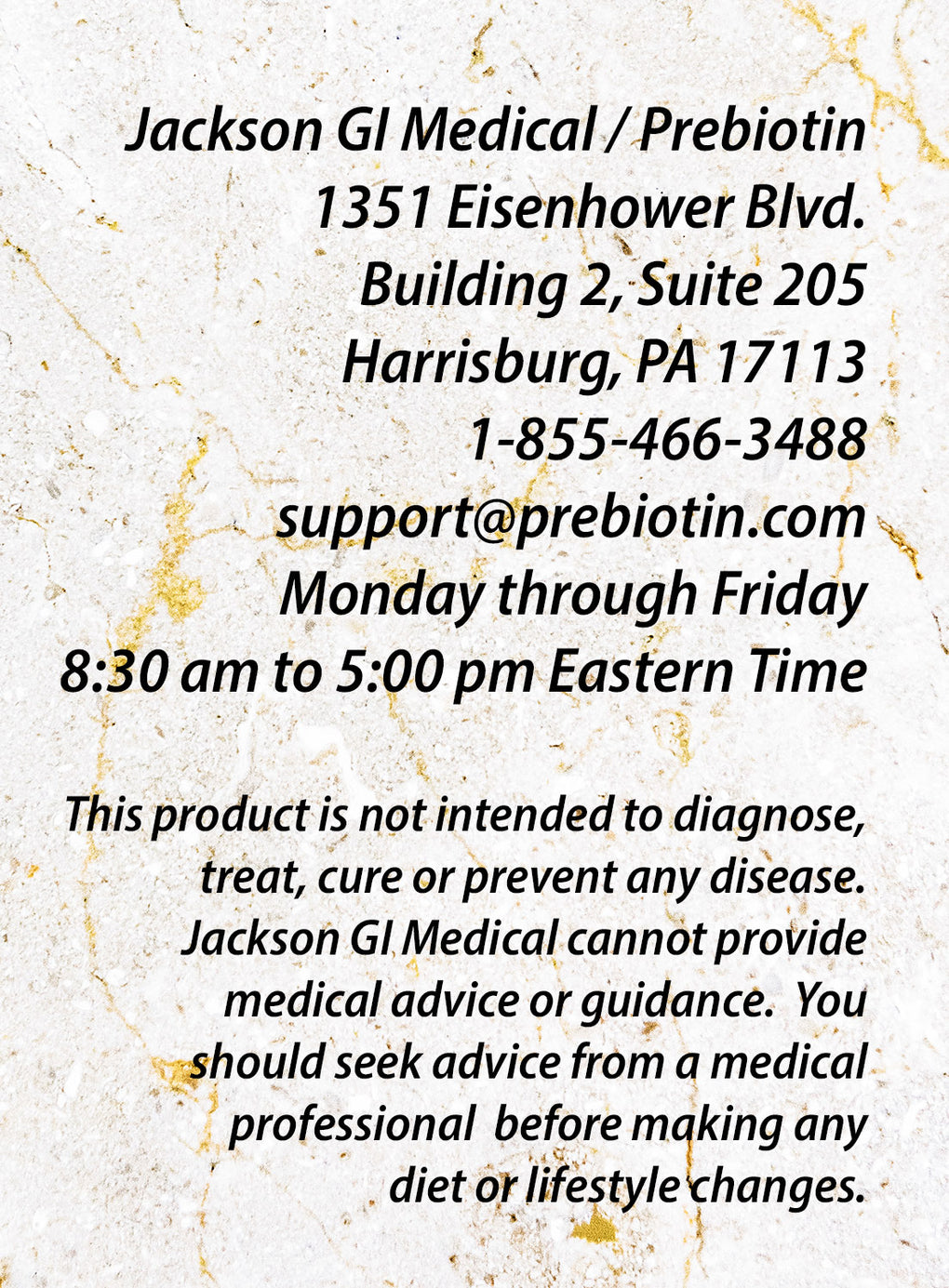
by Dr. Frank Jackson
Prebiotin Academy
Medical Concerns, Scientific Research and Diets
Irritable Bowel Syndrome
Resources on this page:
The Facts
Introduction
Irritable bowel syndrome (IBS) is known by a variety of other terms: spastic colon, spastic colitis, mucous colitis and nervous or functional bowel. Usually, it is a disorder of the large intestine (colon), although other parts of the intestinal tract even up to the stomach can be affected.
When IBS occurs, the colon does not contract normally. Instead, it seems to contract in a disorganized, at times violent, manner. The contractions may be terribly exaggerated and sustained, lasting for prolonged periods of time. One area of the colon may contract with no regard to another. At other times, there may be little bowel activity at all. These abnormal contractions result in changing bowel patterns with constipation being common.
The colon, the last five feet of the intestine, serves a number of important functions in the body. First, it dehydrates and stores the stool so that, normally, a well-formed soft stool occurs. Second, it quietly propels the stool from the right side over to the rectum, storing it there until it can be evacuated. This movement occurs by rhythmic contractions of the colon. A third very important function is to provide and produce a large number of health benefits if fed properly with prebiotic plant fibers. The best way to nourish these bacteria is with a prebiotic fiber supplement.
What Are the Symptoms?
 Most IBS symptoms – abdominal pain, diarrhea, constipation, and bloating – are due to abnormal patterns of bowel contraction. Abdominal discomfort or pain often moves around the abdomen rather than staying in one area. These disorganized, exaggerated and painful contractions lead to certain problems. The pattern of bowel movements is often altered. Diarrhea may occur, especially after meals, as the entire colon contracts and moves liquid stool quickly into the rectum. Or, localized areas of the colon may remain contracted for a prolonged time. When this occurs in the section of colon just above the rectum, the stool may be retained for a prolonged period (constipation) and be squeezed into small pellets. Excessive water is removed from the stool which becomes hard.
Most IBS symptoms – abdominal pain, diarrhea, constipation, and bloating – are due to abnormal patterns of bowel contraction. Abdominal discomfort or pain often moves around the abdomen rather than staying in one area. These disorganized, exaggerated and painful contractions lead to certain problems. The pattern of bowel movements is often altered. Diarrhea may occur, especially after meals, as the entire colon contracts and moves liquid stool quickly into the rectum. Or, localized areas of the colon may remain contracted for a prolonged time. When this occurs in the section of colon just above the rectum, the stool may be retained for a prolonged period (constipation) and be squeezed into small pellets. Excessive water is removed from the stool which becomes hard.
Also, colon gas may accumulate behind these localized contractions, causing the bowel to swell. So bloating and abdominal distress may occur.
Some patients see gobs of mucous in the stool and become concerned. Mucous is a normal secretion of the bowel, although most of the time it cannot be seen. IBS patients sometimes produce large amounts of mucous, but this is not abnormal nor a problem.
IBS is Not a Disease
Although the symptoms of IBS may be severe, the disorder itself is not a serious one. There is no actual disease present in the colon. In fact, an operation performed on the abdomen would reveal a perfectly normal appearing bowel.
Rather, it is a problem of abnormal function. The condition usually begins in young people, often below 40. It is not uncommon in the teens. The symptoms may wax and wane, be particularly severe at some times and absent at others. Over the years, the symptoms tend to become less intense.
IBS is very common and is present in perhaps half the patients that see a specialist in gastroenterology. It tends to run in families. The disorder does not lead to cancer. Prolonged contractions of the colon, however, may lead to diverticulosis, a disorder in which balloon-like pockets push out from the bowel wall because of excessive, prolonged contractions.
Causes
While our knowledge is still incomplete about the function and malfunction of the large bowel, some facts are well-known. Certain foods, such as coffee, alcohol, spices, some raw fruits and vegetables, and, in some people, even milk can cause the gut to malfunction. In these instances, avoidance of these foods is the simplest treatment.
The colon contains a very large number of bacteria types. This is normal and healthy. Very surprisingly, in 2007 it was found that IBS patients had a significantly different makeup of bacteria within the colon. It is likely that a key part of IBS treatment is changing this bacterial makeup by the use of prebiotics.
Infections, illnesses and even changes in the weather somehow can be associated with a flare-up in symptoms. So can the premenstrual cycle in the female.
By far, the most common factor associated with symptoms of IBS is the interaction between the brain and the gut. The bowel has a rich supply of nerves that are in communication with the brain. Virtually everyone has had, at one time or another, some alteration in bowel function when under intense stress, such as before an important athletic event, school examination, or a family conflict. However, people with IBS seem to have an overly sensitive bowel, and perhaps an overabundance of nerve impulses flowing to the gut, so that the ordinary stresses and strains of living somehow result in colon malfunction.
These exaggerated contractions can be demonstrated experimentally by placing pressure-sensing devices in the colon. Even at rest, with no obvious stress, the pressures tend to be higher than normal. With the routine interactions of daily living, these pressures tend to rise dramatically. When an emotionally charged situation is discussed, they can reach extreme levels not attained in people without IBS. These symptoms are due to real physiologic changes in the gut – a gut that tends to be inherently overly sensitive, and one that overreacts to the stresses and strains of ordinary living.
Diagnosing Irritable Bowel Syndrome
The diagnosis of IBS often can be suspected just by a review of the patient’s medical history. In the end, however, it is a diagnosis of exclusion; that is, other conditions of the bowel need to be ruled out before a firm diagnosis of IBS can be made. This process of elimination occurs when the lower gut appears normal but nevertheless produces uncomfortable symptoms that require medical attention.
Irritable Bowel Syndrome Diagnostic Criteria
In general, a person who suffers from IBS notices chronic pain and discomfort over an extended period of time. These symptoms may occur intermittently or over several consecutive weeks. During this period, changes in the stool – including quality and consistency – occur. The changes may include more frequent loose stools or constipation. Bloating and straining is common, as is feeling unable to empty the bowels. If these symptoms are accompanied by weight loss, abdominal pain that isn’t relieved by passing stool, fever or bleeding, then additional testing may be required.
A number of diseases of the gut, such as inflammation, cancer, and infection, can mimic some or all of the IBS symptoms. Certain medical tests are helpful in making this diagnosis, including blood, urine and stool exams, x-rays of the intestinal tract and a lighted tube exam of the lower intestine. This exam is called endoscopy, either sigmoidoscopy or colonoscopy. Sigmoidoscopy reviews the lower colon, while colonoscopy examines the entire length of the colon. Additional tests may be required, depending on the specific circumstances in each case. Checking for lactose intolerance, order a CT scan of the lower internal organs, and blood tests also rule out other lower gut health issues. If the proper medical history is obtained and if other diseases are ruled out, a firm diagnosis of IBS can then usually be made.
Treating IBS
Eating a fiber-rich diet helps the lower gut produce the bacteria and hormones that improve overall health. Prebiotic fiber, in particular, has been proven to fertilize the beneficial bacteria that strengthen the bowel walls, improve mineral absorption and regularity, positively affect appetite control and hormone production, and more. If IBS appears to be a possibility, discuss with your physician how prebiotics and other fibers can aid in the treatment of IBS.
Treatment
The treatment of IBS is directed to both the psyche and the gut. One key element is diet. For a complete review of the most current thoughts on diet in IBS patients, go to Irritable Bowel Syndrome Dietary Therapy further down on this page.
 Current medical thinking about diet has changed a great deal in recent years. There is good evidence to suggest that, where tolerated, a high roughage and bran diet is helpful. To review the many benefits of a high fiber diet, go to the High Fiber Diet page. This diet can result in larger, softer stools which seem to reduce the pressures generated within the colon. In particular, you should select vegetables, fruits and whole grains that are high in insoluble fiber as these fibers do not promote gas. Go to the Fiber Explained page for information.
Current medical thinking about diet has changed a great deal in recent years. There is good evidence to suggest that, where tolerated, a high roughage and bran diet is helpful. To review the many benefits of a high fiber diet, go to the High Fiber Diet page. This diet can result in larger, softer stools which seem to reduce the pressures generated within the colon. In particular, you should select vegetables, fruits and whole grains that are high in insoluble fiber as these fibers do not promote gas. Go to the Fiber Explained page for information.
Prebiotics are a more recently discovered form of soluble plant fibers. These specially formulated soluble fibers stimulate the growth of good bacteria in the colon producing certain well-defined health benefits. Therefore a prebiotic fiber supplement is indicated as part of the diet. Initially, excessive colon gas may occur. The best thing to do is try small amounts and see what the response and symptoms are.
As many people have already discovered, the simple act of eating may, at times, activate the colon. This action is a normal reflex, although in IBS patients it can be exaggerated. In these instances, it is sometimes helpful to eat smaller, more frequent meals to reduce this reflex.
There are certain medications that help the colon by relaxing the muscles in the wall of the colon, thereby reducing the bowel pressure. These drugs are called antispasmodics. Since stress and anxiety may play a role in these symptoms, it can at times be helpful to use a mild sedative, often in combination with an antispasmodic.
Physical exercise, too, is helpful. During exercise, the bowel typically quiets down. If exercise is used regularly and if physical fitness or conditioning develops, the bowel may tend to relax even during non-exercise periods. The invigorating effects of conditioning, of course, extend far beyond the intestine and can be recommended for general health maintenance.
As important as anything else in controlling IBS is learning stress reduction, or at least how to control the body's response to stress. It certainly is well-known that the brain can exert controlling effects over many organs in the body, including the intestine.
Summary
Patients with IBS can be assured that nothing serious is wrong with the bowel. Prevention and treatment may involve a simple change in certain daily habits, reduction of stressful situations, eating better, carefully trying fiber foods and supplements, and exercising regularly.
Perhaps the most important aspect of treatment is a reassurance. For most patients, just knowing that there is nothing seriously wrong is the best treatment of all, especially if they can learn to deal with their symptoms on their own.
Scientific Research
The causes of IBS are still being investigated. However, even now we know that diet is important but in exactly what way, we still do not know. Psychological factors are also known to effect symptoms. What is now certain is that IBS patients have dysbiosis of the colon bacteria. This term means that the types of bacteria within the gut have changed to groups that are simply unfriendly and bad. They are the types that can cause inflammation of the gut wall with leakage of bacterial breakdown products through the wall and into the blood. Additionally, these bad colon bacteria can produce unwanted chemicals or toxins that can slip through the weakened wall of the colon. The following article speaks to these factors.
The main problem with any fiber in IBS patients is whether they cause bloating, gas and excess flatus. Almost all fibers can do this to a certain degree. Wheat bran is mostly insoluble fiber and has the least gas problems. For the average IBS patient, a simple testing method seems to work best. Using a product such as Prebiotin, take just 1/2 scoop once a day in the am for at least a week, maybe longer. Then add a 2nd 1/2 scoop in the mid afternoon. If you are doing well, stay on this does for at least a month. Thereafter, the dose can be increased gradually to tolerance.
The following is a balanced look at prebiotics in IBS patients. What is certain is that diet and prebiotics can not induce any permanent problems. If too many symptoms occur, the simply back off until they clear.
Blogs
 |
Stressed Brain. Stressed GutIrritable Bowel Syndrome: How to Get Your Life BackBy Gabriele Amersbach, Prebiotin Science Writer |
Diet
Introduction
IBS is a very common disorder. Please refer to my essay Irritable Bowel Syndrome for details about this disorder. This information is directed to dietary considerations.
The large bowel or colon is the site of many beneficial bacteria. Our page Prebiotics and Probiotics provides considerable detail on how the colon and its bacteria function together to provide our bodies with certain health benefits. However, the colon is the site for many of the symptoms in IBS patients. Since this organ is where all fiber and other food remnants arrive, it would seem logical that some parts of food we eat might play a role in the symptoms of IBS, which for the most part, are a reflection of an overly sensitive colon.
IBS is currently seen as falling into several major types according to symptoms. Patients will frequently overlap their symptoms or even swing from one type to another. In each case, the diet may play an important role. So there is always some experimentation that each patient must undertake to see which dietary changes work best.
Abdominal Discomfort, Cramps, Bloating
The gut has been called the second brain because it has so many nerve cells within it. IBS patients have an increased nervous sensitivity built into their intestinal tract. This means that minor changes in the way the intestines contract can be perceived as discomfort, whereas in other people it is not. At times, there may be excessive production of colon gas resulting in bloating and discomfort. It is important that you understand how this occurs, namely that colon bacteria ferment soluble plant fibers in the food you eat and some of these bacteria will create harmless gases. You need to understand the difference between soluble fiber and insoluble fiber in your foods.
All fiber goes through the small intestine unchanged. Soluble fiber, as is found in foods such as oats, beans, and fruit pectins, is fermented by the colon bacteria. It is used as a food by these bacteria which, in turn, provide significant health benefits. Some benign colon bacteria will create intestinal gases, mostly hydrogen, which then can move on down and become flatus. Insoluble fiber, on the other hand, is not fermented by colon bacteria and is evacuated relatively unchanged. No colon gas occurs with insoluble fiber.
Constipation Dominant
Constipation occurs when the colon just does not contract well enough or often enough. The stool within it becomes dehydrated and hard. Why does the colon become so lazy and what can be done about it? The diet may be important. Insoluble fibers such as wheat and wheat bran are not fermented by colon bacteria so they do not produce colon gas. At the same time, they retain water and create a large, bulky stool. This, in turn, often stimulates the colon to contract and provide easier evacuation. The first step then is to gradually increase the amount of insoluble fiber up to 10-15 grams a day or even more.
Soluble fibers, on the other hand, are trickier since they are used by colon bacteria as a food source and some of these bacteria make colon gas. Still, these fibers, especially the newly discovered prebiotic ones, produce many benefits within the colon. So, the IBS patient should eat enough soluble fiber to create its health benefit but not enough to produce crampy bloating and flatus.
Go to Fiber Content of Foods for the amount of fiber in each food.
Diarrhea Dominant
There are many causes of diarrhea. Your physician will want to be sure there is not a correctable cause present. For instance, some patients chew sugar-free gum, which is high in the sweetening agent, sorbitol. This can lead to diarrhea. Read the labels. Others may have lactose intolerance, meaning they don’t digest the milk sugar, lactose. The lactose ends up in the colon where it can promote colon gas and diarrhea. There may be chronic infections, such as the parasite, Giardia, residing in the small bowel. Celiac sprue may be a concomitant or even the major problem. When all of these and more are ruled out, then diarrhea-dominant IBS can be diagnosed with confidence.
The next step is to consider the types of fiber in your diet. Increasing insoluble fiber in the diet or with a dietary supplement is worth a try as these can bulk up the stool which, of course, is desirable. Soluble fibers can aggravate diarrhea. However, they, along with probiotic bacteria, can also change the bacterial makeup of the colon in such a beneficial way that it may reduce diarrhea.
Go to the Fiber Explained page for details.
I suggest gradually increasing the insoluble fiber in the diet up to 10 grams or more a day. Following this, I would add prebiotic fibers, either in foods or a dietary supplement in very gradual increasing doses. If there were no change in symptoms, then I would add a probiotic at the direction of your physician. There is no secret here. What works for one IBS patient with diarrhea may not work for another. Judicious trial and error is recommended.
Colon Bacteria in the IBS Patient
We, in medicine, are in a new era regarding what we know about the colon and its inhabitants. What we have known for a long while is that the density and numbers of bacteria within the human colon are greater than any other place in the animal kingdom or, in fact, any place in the world. There are more bacteria in the colon by a factor of 10 than there are cells in the entire body. This is amazing! There is likely a reason and, yes, a good healthy reason for this. We have always thought that there were around 400-500 different species of colon bacteria. We were wrong. The number just discovered in 2007 is closer to 1,000 different species.
A key and likely a very important fact, again just discovered in 2007, is that IBS patients have a significantly different colon bacterial makeup than those people without IBS. This has been a startling finding but, thinking it through, it should not have come as a great surprise. Bacteria flourish in the colon and they provide huge numbers of benefits for us. They rely on the foods we eat and what we used to call waste products for their health. However, in some way, they may be a problem as well. Can changing the bacterial makeup of the colon change the symptoms in IBS patients? This is a key question. A recent research study showed that a certain probiotic formula may reduce the symptoms of cramping and bloating in some IBS patients. We will await more research on what these interesting findings mean for the IBS patients.
Summary
There are no specific and right answers for every IBS patient. There will always be some trial and error necessary to see what is right for you. Still, there are some general principals that may apply to most
patients.
- Gradually reduce animal protein in the diet.
- Increase insoluble fiber and reduce soluble fiber in the vegetables, fruits and whole grains you eat. Go to Fiber Content of Foods for information on foods that are high in insoluble fiber.
- Probiotics. There are 2 that have some demonstrated benefit for bloating. These are VSL#3 and Align. They can be purchased over the counter at any pharmacy, but check with your physician first.
- Prebiotics. Use these cautiously as they may increase gas production, even while they are providing certain bowel benefits
Testimonials
I just can’t believe it and so badly hope I don’t jinx it by talking about it, lol but prebiotin is the best thing to happen to me ever!! I am 80 years young and have had IBS since about age 12. As my husband used to say, “you know where every bathroom is” and truly so. I had begun to think there was something really wrong with my gut but holy cow it’s so much better it’s unbelievable! I only wish I had found you years ago, I could have been “normal”! My gut is so much more “quiet” now. Sorry to rave on and on but just want to thank you for helping me.
- Carol, SC
Explore More
Medical Concerns, Scientific Research and Diets
-
Antibiotics and the Microbiome
-
C. Difficile
-
Calcium and Bone Density
-
Cancer
-
Celiac Disease and Gluten Intolerance
-
Children and Prebiotics
-
Colon Gas and Flatus
-
Colon Polyps and Cancer
-
Constipation
-
Crohn’s Disease
-
Diabetes Type 2
-
Diarrhea
-
Diverticulosis
-
Dysbiosis
-
End Stage Kidney Disease/Dialysis
-
Fatty Liver/Steatohepatitis
-
Fissure, Fistula and Abscess
-
Gut-Brain Connection
-
Heart and Cardiovascular
-
Hemorrhoids
-
High Fiber Diet
-
Immunity
-
Inflammatory Bowel Disease
-
Irritable Bowel Syndrome
-
Leaky Gut Syndrome
-
Low Fat Diet
-
Low Fiber Diet
-
Obesity and Weight Management
-
Toxins in the Colon
-
Ulcerative Colitis





